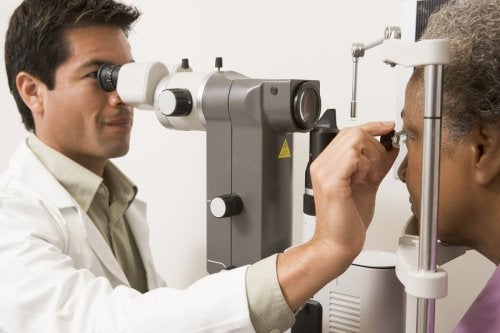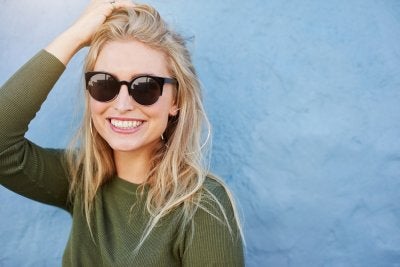-
What Are the Symptoms of Angle-Closure Glaucoma?
Has your ophthalmologist in Chicago informed you that you have a higher than normal risk for glaucoma? If so, then you may benefit from understanding the symptoms of one form of this condition, called angle-closure glaucoma. Someone who has angle-closure glaucoma typically will not notice any symptoms before an attack. Symptoms that you may experience in the early stages of an attack include eye pain, mild headaches, blurred vision, and halos. If you notice any of these symptoms, then see your eye doctor as soon as possible. Other symptoms that are associated with an angle-closure glaucoma attack include eye redness, severe pain in the eye or forehead, blurred or decreased vision, nausea, vomiting, and headache.
Individuals who are over age 40, have high eye pressure, require vision correction, have suffered an eye injury, or have family members with glaucoma have a higher than normal risk of developing this eye disease. Speak with your ophthalmologist to learn about additional risk factors and whether you may be at risk for glaucoma.

-
Tips for Preventing Eye Injuries
As your ophthalmologist in Chicago will tell you, eye care comes down to more than just regular vision check-ups. October is Eye Injury Prevention Month, and there are plenty of steps you can take to help protect your eyes from harm. Read on for some tips on preventing eye injuries.

Gear Up for Sports
Whether you’re a member of an active sports league, or you only play the occasional game of baseball with friends or colleagues, protecting your eyes while participating in athletic activities can be essential for protecting your eye health. While there are many sports that can pose a threat to your eyes, some of the ones that are commonly associated with eye injuries include baseball, hockey, paintball, racquetball, and fishing.
Wear Shades During the Day
With the arrival of fall, you may be less concerned with protecting your body from the sun’s ultraviolet (UV) rays. However, it’s important to realize that UV rays reach the earth’s surface year-round, even on cloudy days. For this reason, you should continue wearing sunglasses that block 100% of UV rays throughout the fall and winter. This eye safety step is particularly important if you plan to spend time skiing or on the water, as sunlight can reflect off of snow and water and potentially harm your eyes. According to ophthalmologists, eyes can suffer something similar to a sunburn, called photokeratitis, when damaged by UV rays.
Practice Safety Throughout Projects
If you have a home improvement to-do list that you’re hoping to get through this season, then your eye doctor would want you to remember to practice good eye safety as you take on each of these tasks. Even small projects, such as installing shelving or trimming shrubs, can lead to eye injuries if you’re not careful. To protect your eyes from the dangers of flying objects like nails, wood splinters, and branches, remember to wear safety glasses or another form of protective eye wear while working on your DIY projects.
-
Finding the Best IOL for You
Intraocular lenses (IOLs) allow many people with cataracts to see clearly again. If you’re considering speaking with your ophthalmologist in Chicago about the benefits of cataract surgery with intraocular implants , then watch this video to learn about finding the best IOL for you.
Before your surgery, your ophthalmologist will measure your eye to determine what strength IOL is right for you. The different types of IOL designs will affect how well you will see without corrective eyewear. To determine the best choice of IOL for you, you will work together with your ophthalmologist and consider factors such as the health of your eyes, your vision needs, and your treatment goals.
-
Recognizing Household Eye Hazards
Good eye care and visits to your eye doctor in Chicago are important year-round. However, October is eye safety month, so now is a great time to learn what objects around your house may pose a threat to your vision. Continue reading to discover some common household eye hazards.

Lawn and Garden Work
If you’re planning to spend time in your yard this season to get your lawn and garden ready for cold weather, then be sure to wear protective eye gear when you do. Tasks that you may have done countless times, such as mowing the lawn or using an electric trencher, can pose a danger to your eyes, as grass, pebbles, twigs, and similar objects may fly out from under the equipment toward your face. For this reason, whether you’re trimming the hedges or the lawn, you can help avoid a trip to the eye doctor by remembering to protect your eyes.
Home Improvement Tasks
If you’re like many homeowners, then you do what you can to take care of basic repairs around the home. While this can be practical and economical, it’s critical to think of your safety when taking on DIY home improvement tasks. Remember to wear safety goggles when you use a drill or hammer nails, work with solvents or hazardous chemicals, or secure objects with bungee cords. Whenever you use tools of any kind or perform tasks that may produce eye irritants or airborne fragments, remember to shield your eyes with the right protective gear.
Day-to-Day Tasks
There are also many everyday activities that can be potentially harmful to your eyes. For example, hot liquid or oil that splatters while you’re cooking can lead to burns, and allowing the cork to fly when opening a bottle of champagne can also cause an eye injury. Taking care to recognize potential hazards for your eyes, no matter what the activity, can help protect your vision. Speak with your eye doctor to learn what else you can do to protect your eyes from household hazards.
